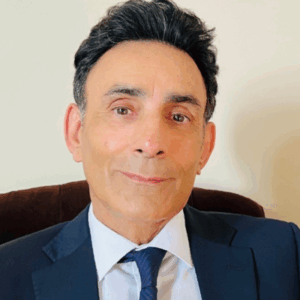

Like many people, veterans can often suffer from substance abuse and co-occurring mental health disorders. Many veterans have had traumatic experiences while serving their country. From injuries to heavy combat, and witnessing the death of close friends, it is understandable how veterans can develop substance addictions and mental health disorders.
Here at Louisville Addiction Center, we offer rehab for veterans in Louisville, Kentucky. As a veterans addiction treatment center, we provide TRICARE addiction treatment for veterans. Veterans have unique needs when it comes to substance abuse and mental health disorders. We understand that and offer specialized treatment.
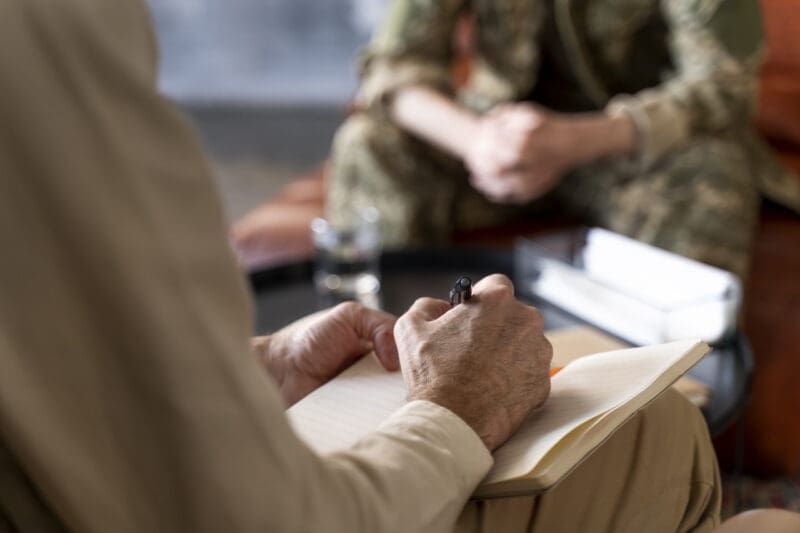
Due to the high levels of stress veterans experience during a combat deployment, veterans can return home with high levels of trauma or mental health disorders. They can experience life-altering injuries and or the following:
As a result of these and other factors, veterans can turn to substances to cope with their unique traumas. Sadly many veterans don’t get the help that they need. This is due to the social stigmas that exist around mental health and substance abuse in the military.
Many service members will not risk using drugs while on active duty. This is because it would result in a dishonorable discharge. However, alcohol use and binge drinking has been known to be a large silent aspect of military culture.
This drinking often continues after they return to civilian life. The National Institute on Drug Abuse (NIDA) has stated that 65% of veterans entering treatment centers used alcohol as their primary substance of choice. This is near twice the rate of civilians.
Veterans who abuse alcohol have a higher risk of:
Thankfully, opioid addiction is less common amongst those with a military background than civilians. However, vets are still affected by opioid use. Many veterans have been prescribed painkillers for injuries they sustained during their service.
These drugs are highly addictive, especially when the person is also dealing with a mental health diagnosis. Vets have also been prescribed opioid prescriptions for their mental health diagnosis. As a result, those diagnosed with a mental health disorder were more likely to become addicted to prescription opioids.

A co-occurring mental health disorder is when an individual is dealing with a mental health disorder along with a substance use disorder. Co-occurring mental health disorders are especially common among veterans. This is because veterans can experience mental health issues like anxiety and depression due to the trauma they may have experienced. They may also use substances to self-medicate.
Unfortunately, depression is quite common in the United States. Moreover, depression is even more common among veterans. A 2014 study found that veterans were more likely than non-veterans to have depression or anxiety. This is a result of the high-stress levels and exposure to combat many veterans have experienced during their service.
Anxiety is typically characterized by feelings of dread and worry. This can have physical symptoms as well such as rapid heartbeat and sweating. Many veterans have trouble readjusting to home life after their service.
In combat, vets have to be on their toes to survive. This often continues well after their service. As a result, veterans can be left with intense anxiety post-combat. When anxiety continues and interferes with day-to-day life, this can be characterized as an anxiety disorder.
Symptoms like problems sleeping, nausea, and shaking can occur on a regular basis. At this time, it is difficult to know what exactly causes an anxiety disorder. However, researchers believe factors like exposure to stressful life events, shyness, and parental history of mental illness can be risk factors. As a result, veterans are at risk of developing an anxiety disorder, especially if they have a parental history of mental disorders.
Bipolar disorder is characterized by extreme high and low emotional periods. Someone with bipolar disorder may feel extremely energetic and unstoppable for days at a time. In contrast, they can feel exhausted and drained for days at a time after feeling emotional highs. These high and low periods can make it very difficult to function at work and in social settings
At this time, no one knows what causes bipolar disorder. However, research suggests that there are a few factors that could make it more likely that someone develops bipolar disorder.
These factors could play a role in developing bipolar disorder. Stressful life events and drugs and alcohol are especially relevant for veterans.
Post-traumatic stress disorder (PTSD) can occur when someone experiences a traumatic event. Sexual assault, betrayal, combat, and emotional and mental abuse can cause PTSD. The person can often relive the traumatic event they have experienced. The traumatic event can manifest itself in dreams and be brought on by various triggers.
As a result, people with PTSD may find themselves avoiding:
Individuals will avoid these triggers because they remind them of their trauma. This causes shame, embarrassment, and even self-loathing.
Lasting change happens when proven medical science meets whole-person wellness. Louisville Addiction Center combines gold-standard clinical interventions with mind-body supports, creating a toolbox that tackles the biological, psychological, and social roots of substance use.
This integrated “how” behind our outcomes gives clients practical skills and measurable relief, not temporary fixes.
Physicians prescribe FDA-approved medications such as buprenorphine or naltrexone for opioid misuse and acamprosate for alcohol dependence to curb cravings and stabilize brain chemistry.
Doses are reviewed weekly, adjusted to side-effect profiles, and always paired with counseling.
Medication-Assisted Treatment provides a safer physiological runway, allowing clients to focus on rebuilding routines, relationships, and emotional resilience rather than fighting constant urges.
Unresolved trauma frequently fuels relapse. Louisville Addiction Center’s trauma therapists use Eye Movement Desensitization and Reprocessing to calm the nervous system and reprocess distressing memories, while Brainspotting pinpoints stored somatic pain through guided eye positions. Both methods reduce hyper-arousal and intrusive thoughts, creating mental space for healthier coping strategies and making other therapies more effective.
Cognitive Behavioral Therapy helps clients identify triggers, challenge distorted thinking, and practice alternative behaviors.
Dialectical Behavior Therapy adds modules on emotion regulation and distress tolerance—skills critical during early recovery and high-stress moments.
Together, CBT and DBT provide structured, repeatable tools that clients can apply at work, home, or in social settings to maintain momentum.
Gentle yoga sessions ease muscle tension, steady breathing, and support better sleep. Art therapy turns paint or clay into a simple way to name hard emotions and discuss them in counseling. Both activities supply clear, hands-on tools for managing stress between clinical appointments.
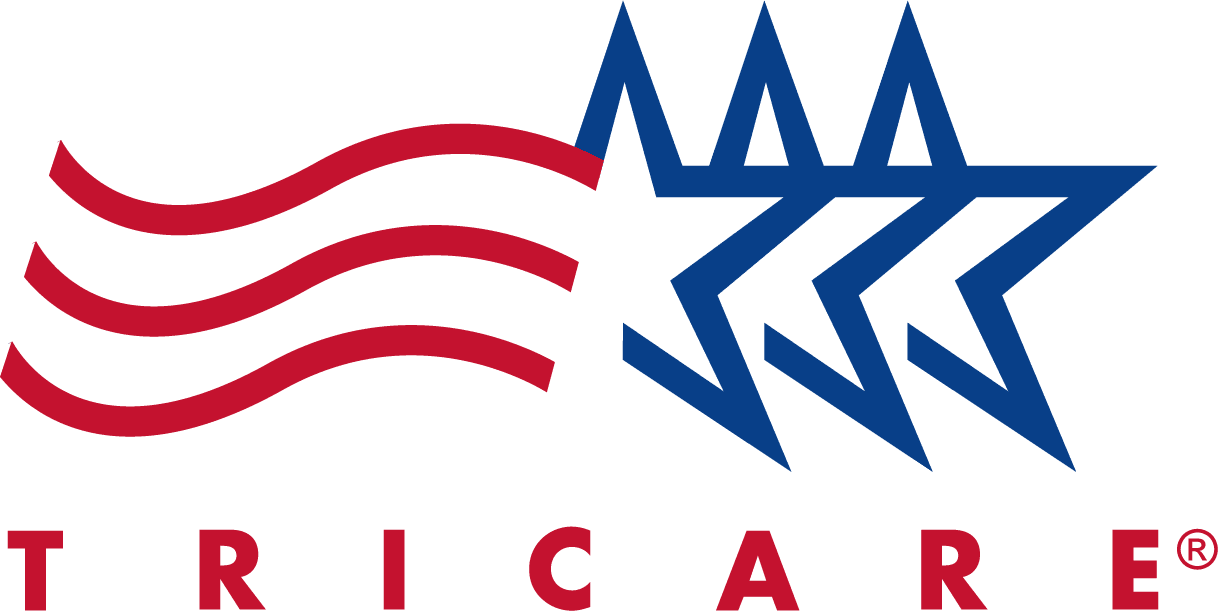
TRICARE is the healthcare program for the U.S. military. It is a government-managed single-payer health insurance. TRICARE covers addiction treatment. However, some services depend on the person’s specific plan.
TRICARE covers the following for addiction treatment:

If you or someone you love is experiencing substance use and mental health disorders, the Louisville Addiction Center offers rehab for veterans in Louisville, Kentucky. We are a veteran’s addiction treatment center.
We understand the unique treatment needs of veterans. The traumatic experiences that veterans have often experienced cause co-occurring health disorders. We have the expertise and programs to help with addiction treatment.
Contact us to start your treatment journey.
Veterans often struggle with one or more of the following alongside addiction:
They combine evidence-based clinical treatments with holistic supports, including:
Yes—TRICARE covers many addiction treatment services, though exact coverage depends on the individual’s specific plan. Covered services may include: in-office opioid treatment, residential treatment, PHP (Partial Hospitalization Program), IOP (Intensive Outpatient Program), inpatient services, detox, and opioid treatment programs.
Because of their background, veterans often face distinct challenges: trauma (combat or service-related), mental health issues, physical injuries, and difficulty adjusting back to civilian life. Louisville Addiction Center offers specialized programming that addresses these factors explicitly
You can reach out through the admissions hotline (502-586-4554) or email (admissions@louisvilleaddictioncenter.com) to begin the process. The staff can help you verify benefits, explore programs, and begin intake.
Louisville Addiction Center serves many areas in Kentucky, including Louisville and surrounding regions.
Because many veterans have co-occurring disorders—mental health issues such as PTSD, depression, anxiety, bipolar—which often intertwine with substance use. Treating both concurrently is more effective for long-term recovery.
Get Family Support Now
We understand addiction affects the whole family. Our comprehensive family program helps rebuild trust and restore relationships.
Weekly Family Therapy Sessions
Educational Workshops
Support Groups
Communication Skills Training
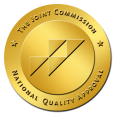

Department of Veterans Affairs & Department of Defense. (2023). Clinical practice guideline for the management of posttraumatic stress disorder and acute stress disorder. VA/DoD Clinical Practice Guidelines. arXiv+12PTSD.VA.gov+12PTSD.VA.gov+12
Schnurr, P. P., Hamblen, J. L., Wolf, J., Coller, R., Collie, C., Fuller, M. A., Holtzheimer, P. E., Kelly, U., Lang, A. J., McGraw, K., Morganstein, J. C., Norman, S. B., Papke, K., Petrakis, I., Riggs, D., Sall, J. A., Shiner, B., Wiechers, I., & Kelber, M. S. (2024). The management of posttraumatic stress disorder and acute stress disorder: Synopsis of the 2023 U.S. Department of Veterans Affairs and U.S. Department of Defense clinical practice guideline. Annals of Internal Medicine, 177(3), 363–376. https://doi.org/10.7326/M23‑2757 PTSD.VA.gov+2PTSD.VA.gov+2
Lang, A. J., Hamblen, J. L., Holtzheimer, P. E., Kelly, U., Norman, S. B., Riggs, D., Schnurr, P. P., & Wiechers, I. (2024). A clinician’s guide to the 2023 VA/DoD clinical practice guideline for management of posttraumatic stress disorder and acute stress disorder. Journal of Traumatic Stress, 37(1), 19–34. https://doi.org/10.1002/jts.23013 Wikipedia+12PTSD.VA.gov+12PTSD.VA.gov+12
Substance Abuse and Mental Health Services Administration. (2023). Key substance use and mental health indicators in the United States: Results from the 2022 National Survey on Drug Use and Health (HHS Publication No. PEP23‑07‑01‑006, NSDUH Series H‑58). Center for Behavioral Health Statistics and Quality. https://www.samhsa.gov/data/report/2022-nsduh-annual-national-report SAMHSA+8SAMHSA+8SAMHSA+8
RAND Veterans Policy Research Institute. (2024). National Survey on Drug Use and Health (NSDUH): Veterans data hub codebook. RAND Corporation. arXiv+10RAND Corporation+10RAND Corporation+10
National Center for PTSD. (2023). Treatment of co‑occurring PTSD and substance use disorder in VA. U.S. Department of Veterans Affairs. Retrieved from PTSD VA website PTSD.VA.gov




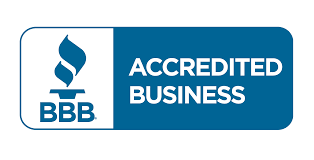




Department of Veterans Affairs & Department of Defense. (2023). Clinical practice guideline for the management of posttraumatic stress disorder and acute stress disorder. VA/DoD Clinical Practice Guidelines. arXiv+12PTSD.VA.gov+12PTSD.VA.gov+12
Schnurr, P. P., Hamblen, J. L., Wolf, J., Coller, R., Collie, C., Fuller, M. A., Holtzheimer, P. E., Kelly, U., Lang, A. J., McGraw, K., Morganstein, J. C., Norman, S. B., Papke, K., Petrakis, I., Riggs, D., Sall, J. A., Shiner, B., Wiechers, I., & Kelber, M. S. (2024). The management of posttraumatic stress disorder and acute stress disorder: Synopsis of the 2023 U.S. Department of Veterans Affairs and U.S. Department of Defense clinical practice guideline. Annals of Internal Medicine, 177(3), 363–376. https://doi.org/10.7326/M23‑2757 PTSD.VA.gov+2PTSD.VA.gov+2
Lang, A. J., Hamblen, J. L., Holtzheimer, P. E., Kelly, U., Norman, S. B., Riggs, D., Schnurr, P. P., & Wiechers, I. (2024). A clinician’s guide to the 2023 VA/DoD clinical practice guideline for management of posttraumatic stress disorder and acute stress disorder. Journal of Traumatic Stress, 37(1), 19–34. https://doi.org/10.1002/jts.23013 Wikipedia+12PTSD.VA.gov+12PTSD.VA.gov+12
Substance Abuse and Mental Health Services Administration. (2023). Key substance use and mental health indicators in the United States: Results from the 2022 National Survey on Drug Use and Health (HHS Publication No. PEP23‑07‑01‑006, NSDUH Series H‑58). Center for Behavioral Health Statistics and Quality. https://www.samhsa.gov/data/report/2022-nsduh-annual-national-report SAMHSA+8SAMHSA+8SAMHSA+8
RAND Veterans Policy Research Institute. (2024). National Survey on Drug Use and Health (NSDUH): Veterans data hub codebook. RAND Corporation. arXiv+10RAND Corporation+10RAND Corporation+10
National Center for PTSD. (2023). Treatment of co‑occurring PTSD and substance use disorder in VA. U.S. Department of Veterans Affairs. Retrieved from PTSD VA website PTSD.VA.gov









Get Family Support Now
We understand addiction affects the whole family. Our comprehensive family program helps rebuild trust and restore relationships.
Weekly Family Therapy Sessions
Educational Workshops
Support Groups
Communication Skills Training


Hear directly from those who have walked the path to recovery. Our patients’ stories highlight the compassionate care, effective programs, and life-changing support they’ve experienced. Let their journeys inspire you as you take your first steps toward healing.
Louisville Addiction Center is helping people in Kentucky overcome addiction and mental health challenges.